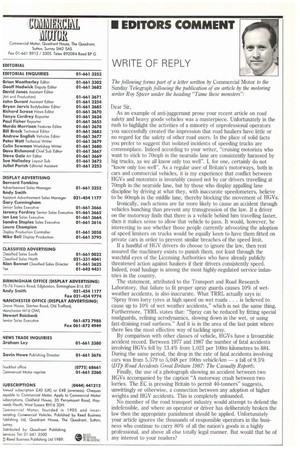Dear Sir, As an example of anti-juggernaut prose your recent
Page 7

If you've noticed an error in this article please click here to report it so we can fix it.
article on road safety and heavy goods vehicles was a masterpiece. Unfortunately in the rush to highlight the activities of a minority of unprofessional operators you successfully created the impression that road hauliers have little or no regard for the safety of other road users. In the place of solid facts you prefer to suggest that isolated incidents of speeding trucks are commonplace. Indeed according to your writer, "cruising motorists who want to stick to 70mph in the nearside lane are consistently harassed by big trucks, as we all know only too well". 1, for one, certainly do not "know only too well". As a regular user of Britain's motorways, both in cars and commercial vehicles, it is my experience that conflict between HGVs and motorists is invariably caused not by car drivers travelling at 70mph in the nearside lane, but by those who display appalling lane discipline by driving at what they, with inaccurate speedometers, believe to be 60mph in the middle lane, thereby blocking the movement of HGVs.
Ironically, such actions are far more likely to cause an accident through vehicles bunching than prevent any transgression of the law. If a driver on the motorway finds that there is a vehicle behind him travelling faster, then it makes sense to allow that vehicle to pass. It would, however, be interesting to see whether those people currently advocating the adoption of speed limiters on trucks would be equally keen to have them fitted on private cars in order to prevent similar breaches of the speed limit.
If a handful of HGV drivers do choose to ignore the law, then rest assured the machinery exists to punish them, not least through the watchful eyes of the Licensing Authorities who have already publicly threatened action against hauliers if their drivers consistently speed. Indeed, road haulage is among the most highly-regulated service industries in the country.
The statement, attributed to the Transport and Road Research Laboratory, that failure to fit proper spray guards causes 10% of wetweather accidents, is also inaccurate. What TRRL actually says is: "Spray from lorry tyres at high speed on wet roads. . . is believed to cause up to 10% of wet weather accidents," which is not the same thing. Furthermore, TRRL states that: "Spray can be reduced by fitting special mudguards, refining aerodynamics, slowing down in the wet, or using fast-draining road surfaces." And it is in the area of the last point where there lies the most effective way of tackling spray.
By comparison with other classes of vehicle, HGVs have a favourable accident record. Between 1977 and 1987 the number of fatal accidents involving HGVs fell by 13.4% from 1,021 per 100m kilometres to 884. During the same period, the drop in the rate of fatal accidents involving cars was from 5,579 to 5,048 per 100m vehicle/km — a fall of 9.5% (Dip Road Accidents Great Britain 1987: The Casualty Report).
Finally, the use of a photograph showing an accident between two HGVs accompanied by the caption "A motorway crash between two lorries. The EC is pressing Britain to permit 40-tonners" suggests, unwittingly or otherwise, a connection between any adoption of higher weights and HGV accidents. This is completely unfounded.
No member of the road transport industry would attempt to defend the indefensible, and where an operator or driver has deliberately broken the law then the appropriate punishment should be applied. Unfortunately your article ignores the thousands of responsible operators in the business who continue to carry 80% of all the nation's goods in a highly professional, and above all else totally legal manner. But would that be of any interest to your readers?


























































































































